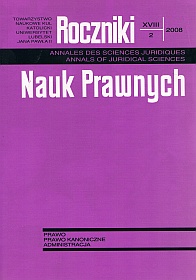Kompetencje biskupa diecezjalnego w zakresie posługi słowa Bożego według Kodeksu Prawa Kanonicznego z 1983 r.
Abstrakt
The article offers an answer to the question as to what competences are granted by the Code of Canon Law (1983) to the diocesan bishop for his Divine Word ministry. The legislator directs the bishop to fulfil this ministry personally and also to moderate and oversee its fulfilment by other thus entitled persons.
The diocesan bishop, being the chief preacher of the Word of God in the diocese entrusted to his care, must remember that he is expected to undergo a constant spiritual and intellectual formation because he is to safeguard the heritage of Faith and Tradition. Hence, he will be able to guard himself against promoting views which do not reflect the teaching of the Church. The prerequisite for maintaining the bishop’s authority deriving from his episcopal anointment is that he remain in ties of unity and obedience to the Pontiff of Rome and the College of Bishops. The authenticity of his testimony, on the other hand, will add credibility to his authority. He can fulfil his ministry at any location in the world unless he is expressly forbidden to do so by the Ordinary of the place due to a serious cause. In comparison with the Code of 1917, this is a major change. Formerly, such privilege was restricted only to cardinals.
With regard to his colleagues in his Divine Word ministry, the diocesan bishop is obliged by the law to take care of their formation and growth. He is entitled to revoke the mandate of those who teach content that disagrees with the Magisterium. In terms of catechetics, he has necessary competences to lay down norms that further expand on the Universal Law but keep within it. Of particular note to the bishop are the media, especially those who are responsible for dissemination of the Catholic doctrine.
Copyright (c) 2008 Roczniki Nauk Prawnych

Utwór dostępny jest na licencji Creative Commons Uznanie autorstwa – Użycie niekomercyjne – Bez utworów zależnych 4.0 Międzynarodowe.


